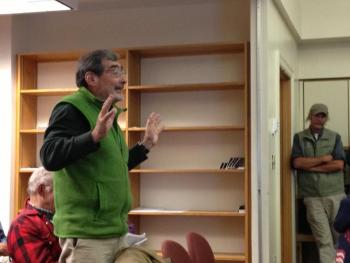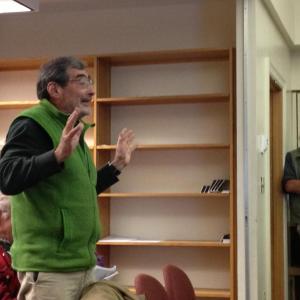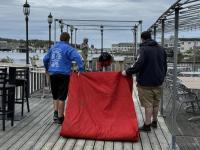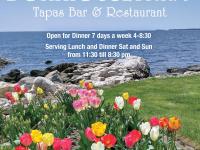TIF talks get contentious
The Boothbay Board of Selectmen has been inundated with questions about the proposed TIF district and the $2.5 million bond that has kept many residents wondering what the future of Boothbay will be pending the November 5 referendum.
The public forum on October 23 showcased both sides of the TIF and bond issues. Proponents say the TIF will stimulate the local economy and attract new businesses and jobs to the region for the next 30 years.
But opponents find the TIF to be a rushed effort with too many unknowns, one which could dramatically change the character of the town.
A yes vote for Question 2 will create a TIF or tax incremental financing district in Boothbay.
The TIF district would designate a fund for public projects aided by the expansion of the Boothbay Harbor Country Club. It would freeze the property value within a 272-acre district and bring in new tax revenue from the increase of property value.
The TIF revenue generated could help finance public infrastructure such as roads, sidewalks, parking and other economic development throughout the town.
A yes vote for Question 3 would authorize the selectmen to take out a $2.5 million bond.
In theory, the TIF proceeds would pay off the bond entirely, and generate an estimated $1.2 million over the next 30 years to go towards public infrastructure projects like the Boothbay Village Improvement Plan.
The Boothbay Village Improvement Plan has been among the most controversial topics of discussion. Although the selectmen said the details of the plan are fluid, the plan has been met with vehement opposition to a traffic roundabout in the Boothbay Common area, detailed in a preliminary drawing from a 2002 study by the Maine Department of Transportation.
The selectmen said nothing would be done to change the Boothbay Common without public input and oversight from an advisory committee. The traffic plan is indirectly related to the bond question. Voters are not being asked to approve a traffic plan on November 5.
A majority of selectmen have touted the TIF district as way to attract businesses to the area, but selectman Chuck Cunningham said he has his reservations.
“When I first looked at this, at first glance, I liked it,” Cunningham said at the first public forum on October 9. “Whenever you rush anything, you make mistakes, and there's a lot in here that, frankly guys, I don't like it.”
Despite the small amount of time in which the town has informed voters, the aim is to get the TIF and bond questions on the November 5 ballot. According to selectmen, any change would delay the plan to next year's town meeting, which would result in a 40 percent loss in TIF funds, and render the town less likely to secure matching funds from the state to accompany the bond money.
Opponents of the plan said the TIF district would open doors to unwanted industry that would damage the unique character of Boothbay.
“What you're concentrating on are businesses that don't fit this place like Hodgdon does, like Washburn does, like the (Coastal Maine Botanical) Gardens does,” said Rhoda Weyr of Boothbay. “We've got to work with what we’ve got and not pretend that we're something else, and that's why I'm against it.”
Boothbay Town Manager Jim Chaousis countered the misconception that the town would attract heavy duty industry into the proposed TIF district.
"We're proposing to allow more business improvement in the district. Those businesses like Bet's Fish Fry or Cottage Connection; businesses that already fit in the town of Boothbay are going to be the types of businesses that prosper,” Chaousis said.
One of the incentives for prospective businesses is a credit enhancement agreement. CEAs are tax rebates that can be offered at a 100 percent return at the discretion of the selectmen.
Boothbay Harbor Country Club owner Paul Coulombe opted out of a CEA for the proposed TIF and will pay full taxes on his property. Boothbay's two existing TIF districts, Washburn & Doughty and Hodgdon Yachts shipyards, each receive a 70 percent tax rebate for a credit enhancement agreement.
Selectmen’s chairman Steve Lewis said CEAs have caused some concern amongst the public and the selectmen. Lewis made a motion for a moratorium on CEAs until a public supported TIF policy is approved at the next town meeting, pending the results of the November 5 referendum. The motion passed with unanimous support.
Before the public discussion adjourned, Mike Tomacelli, a local business owner and supporter of the TIF district, offered a sobering reminder of jobs lost in Boothbay.
Tomacelli recalled Rynel Inc., a manufacturing company that was in Boothbay's Industrial Park in the 1990s. Rynel had about 30 employees and wanted to expand, but the company couldn't get an adequate waterline. The company left town in 2005 and relocated to Wiscasset. Rynel currently has about 125 employees.
“If certain things were in place in this town, in this Industrial Park, they might return,” Tomacelli said. “That's was a loss for this community. We should never let that happen again.”
For more information, the Boothbay town office will have open office hours on October 31 from 9 a.m. to 4 p.m. The last public forum will be at the Boothbay Town Hall on November 4 at 6 p.m. at the Boothbay Railway Village.
Event Date
Address
United States

























